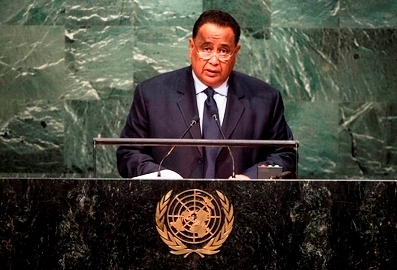Sudan accuses powerful nations of exerting control over UN
September 2, 2015 (KHARTOUM) – Sudan’s foreign minister Ibrahim Ghandour has criticized the United Nations saying the international organization fell under the domination of some powerful countries.

Sudan’s top diplomat said he discussed with the under-secretary general of the UN and the head of the peacekeeping operations the exit of the hybrid peacekeeping mission in Darfur (UNAMID).
The Sudanese government called since late last year to speed up discussions on the UNMAID exit strategy pointing to the progress to achieve peace in Darfur.
He stressed that the UN doesn’t carry out its duties in the form required; pointing that some countries are controlling its resolutions to the extent that it appears as a unilateral international order.
The Sudanese foreign minister in his speech before the UN Assembly general on Friday called for a comprehensive reform for the UN institutions particularly the Security Council to achieve equal representation, democracy and transparency.
” in particular the Security Council, which is in need of a comprehensive reform process to ensure broader representation, especially representation therein of African nations, in both the permanent and non-permanent categories, beside reforming its functions methodology, work patterns and rules of procedure, away from politicisation, selectivity and double standards,” Ghandour said.
Previously he denounced the imposition of sanctions against his country and repeated indirect accusations against the U.S. administration which he said continues to create obstacles to bar the Sudan from benefiting of the Heavily Indebted Poor Countries (HIPC) Initiative for political reasons.
“My country’s reward for achieving peace and stability and for all the sacrifices it made, was endless pressure, sanctions, boycotts and unilateral and coercive measures,” he said alluding to the 2005 peace agreement that led to the South Sudan’s secession and the Doha Document for Peace in Darfur of 2011.
IMPACT OF SANCTIONS ON SUDAN
Meanwhile, Sudan’s National Group for Human Rights (NGHR) has held a symposium in Geneva during the works of the 30th UN Human Rights Council Meeting under the title “The Impact of the Unilateral Coercive International Sanctions on Sudan”.
Washington imposed economic and trade sanctions on Sudan in 1997 in response to its alleged connection to terror networks and human rights abuses. In 2007 it strengthened the embargo, citing abuses in Darfur which it labeled as genocide.
The speakers at the symposium agreed that the sanctions lack the moral and legal bases, saying that sanctions are used as a tool against the African people.
NGHR director, Ibrahim Abdel-Halim, told the official news agency (SUNA) that the speakers offered legal evidence to support their argument that coercive sanctions represent a clear violation to the international laws and norms.
According to him, the speakers called for developing measures to address the negative impact of unilateral coercive sanctions on peoples besides launching a campaign to resist the sanctions.
They also called for developing a mechanism and preparing a detailed study on the negative impact of coercive sanctions on peoples.
The speakers also urged for engaging the entire societies in this campaign against the “neo-colonialism”.
Abdel-Halim added that the Center for Community Studies (CCS) made a statement showing that official bodies and civil society organizations provided the necessary support to deliver humanitarian assistance to the needy population in conflict areas particularly in South Kordofan and Blue Nile.
The Sudanese army and its allied militias have been fighting Sudan People’s Liberation Movement/North (SPLM-N) rebels in Blue Nile and South Kordofan since 2011 and a group of armed movements in Darfur since 2003.
(ST)
